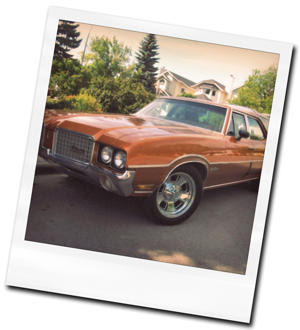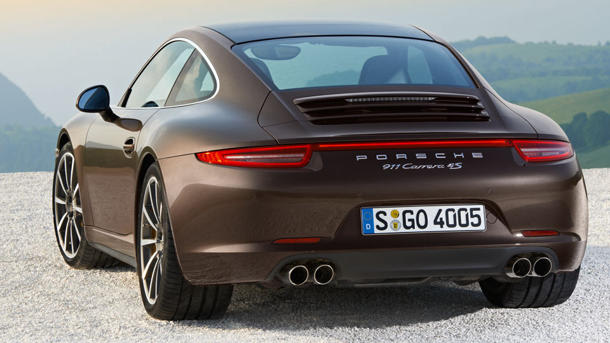Silver was the most popular exterior car color in America for nearly a decade. But while it remains beloved by automotive designers for best showing off a car's styling, its unstinting argent reign was finally overthrown this year. By white. According to Sandy McGill, BMW Designworks' lead designer in color, materials, and finish, this is Steve Jobs' doing. "Prior to Apple, white was associated with things like refrigerators or the tiles in your bathroom. Apple made white valuable."
Valuable, yet boring. So while the rise in white's snowy stock may be good news for the luxury market — white is high maintenance, thus luxurious — it's a pale palliative for those of us with a bit more pigment in their palette. Fortunately, our expert interviews and analysis reveal that more enticing colors are emerging.
Light blue's ascension is connected to environmental wellbeing: clear skies, clean water. Crisp oranges are migrating from the world of high-end outdoor equipment. New paint technology may finally allow fashion's passion for fluorescents to flow from the runways onto the highways. And, as always, the smart money's on gold: as its price and profile have skyrocketed, so has its demand as a coating.
But the most enticing color trend, from our perspective, is the return of brown. After all, what could be more compelling to unicorn-riding Rainbow Brites like us than the hue derived — as any child left too long at an easel will readily demonstrate — from combining every shade in the visible spectrum?
As recently as 2008 articles and experts were prognosticating the "extinction" of brown as an automotive exterior color: it was too rooted in the malaise of the 1970s, it blended in too well with the scenery, it lowered resale value. Even the aesthetically-bereft American Automobile Association (AAA) danced on brown's loamy grave, claiming, in their Car and Color Safety dispatch of 2004 that, "brown, black, and green cars [are] roughly twice as likely as white cars to be involved in crashes resulting in serious injury."
But, like every cinematic hero, the very moment of brown's alleged eradication presaged its incipient resurrection. According to paint giant PPG's Global Color Manager, Jane Harrington, brown's latest uptick is based in its ability to convey stability and comfort, as well as the kind of authenticity that consumers— especially luxury consumers — seek. "Think of the experience of good coffee, good chocolate, great pieces of wood," Harrington told us, referencing the entire field of upscale umbric goods. "You're seeing it across the crafts industry: more genuine materials, something that has longevity. The handmade quality people are looking for in luxury."
High end car makers like Mercedes, BMW, Mini, Porsche, Rolls-Royce, and Bentley have all begun investigating what brown can do for them, with each marque offering at least two — and in the case of Bentley, a full half-dozen — earthy shades on their contemporary offerings. But we're also starting to see brown trickle down into the lower ends of the automotive marketplace. Ford now offers its Taurus sedan and Escape SUV in Kodiak Brown, as well as proffering a caramelly Golden Bronze dip on its best-selling F-150. And Toyota, though famous for producing cars that are both literally and figuratively beige, has also began to polish the mahogany, offering a quartet of browns on models like the Venza, Avalaon, RAV-4, and Tacoma (though, ironically, you cannot purchase a Sienna in brown.)
But brown's delightfully filthy insurgency isn't based solely on its connection to the composted topsoil used to grow your heirloom radishesm or the Kopi Luwak coffee beans pooped out by a Sumatran civet cat and roasted for your artisanal espresso. Nor is it merely surfing the aspirational wave a few coats may bring to the mass-market. It's also fueled by a deep-seated fondness for the past.

Or, at least that's what Alex Nuñez thinks. As Senior Automotive Editor at Consumer Search, and Weekend Editor at Autoblog, he is an industry expert. But it's his role as founder of Facebook's Brown Car Appreciation Society — which now includes nearly 600 members, mainly automotive writers, analysts, and pundits — that catalyzed our interview. "I think it's a nostalgia thing for guys our age. I'm 40, and we grew up at a time when you had all these brown cars in active use," Nuñez said. "Maybe it's that a lot of people who are in decision-making positions in the car industry are of that age, and this stuff is sort of subliminally ingrained as a feel good thing — these browns and earth tone colors."
Experts like Jane Harrington and Sandy McGill are hard at work tracking the next big incipient color trend — bronzes, with their patinaed implication of history and refinement; aluminum flakes that make metallic paints more silky; even digital OLEDs that can display anything, like an automotive iPad. But when we asked Nuñez if there were other color trends he was stalking, he didn't hesitate. "Not really." He is interested only in seeing brown deepen its fecund reign. "I'm disappointed that you can't order a Mustang Boss 302 in brown, or a brown Camaro. So there's still opportunity for expansion."
